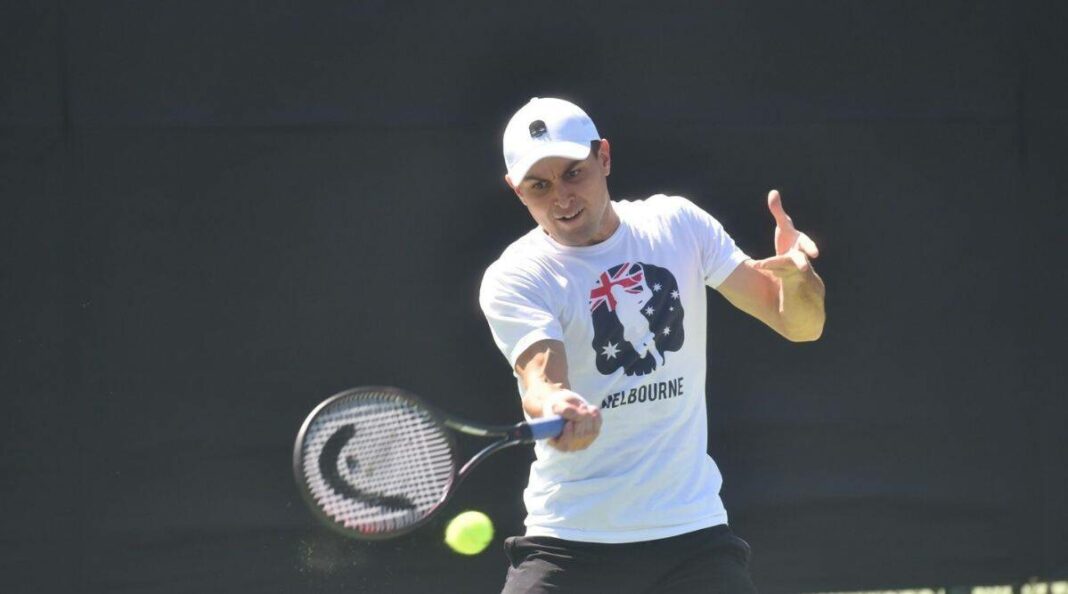Aslan Karatsev couldn’t really spout a Dostoevsky or even summon a handy Meddy-ism, a la Daniil Medvedev, but he drew out the chuckles anyway. The World No 15 had just made the quarters of the 2021 Australian Open beating Felix Auger-Aliassime and was facing the press that was quizzing him intently on digging deep and other profundities. Russian tennis players are expected to lace ironies with dark humour, and humour with gravitas. The then 27-year-old, who made semis at Melbourne last year, though, would put a pin prick to the nice bubble.
Recalling the interaction while playing at the Tata Open Maharashtra on arrival, Karatsev peals off: “So the journalist asked me, ‘What was your self-talk to yourself during the break at the toilet?’ He was expecting some special answer. But I said, ‘It was just the toilet.’ And the answer came out everywhere on Instagram,” he chortled. There’s a wave of Russian challengers coming for the titles, but Karatsev reckons it’s a randomly coincidental surge, and not some planned emergence.
Also, Safin and Medvedev might be a hack’s delight with all that they spoke. But there are Russians, and then there are other Russians.
Say hi to the Singles Top Seed at #TataOpenMaharashtra 2022 😍@AsKaratsev is prepping up in Pune 💪🎾#AdvantagePune #ATPTour #ATP #Tennis | @msltatennis @tatacompanies @atptour pic.twitter.com/e0Bpl8E6p2
— Tata Open Maharashtra (@MaharashtraOpen) January 31, 2022
Top seed at Pune, the multi-lingual pro who speaks Russian, Hebrew and English, says “working very hard” might be the only common trait across the bunch that has signalled a resurgence after a lull. “Before, we had a big gap after Marat, Kafelnikov. There was nobody in Top 10, Top 5. There were players in Top 100. Not like now with 4 players in Top 30, maybe we are working harder than others. But I don’t know, everyone works hard,” he says matter-of-factly.
Karatsev moved to Israel where he started tennis early. “My sister played. So I started playing at 3 and half. Till age of 12 I was playing in Israel where my mother and sister were. There were financial problems from 13 to 16 years. Then I found a Russian sponsor and moved back,” he recalls. Stints in Moscow for two years, then Germany, Spain, and Croatia followed. “Last two and half years I’m training in Minsk,” he adds, of working with a Spanish coach.
For the widely-travelled pro, the first push had come from a Russian who had in fact won his earliest title at the Mumbai ATP in 2006 – Dmitry Tursunov, a hoot of a character. Inspiration in the lean years though came from the earlier generation.
“All of them were great players who showed we could compete at highest level for so many years and hence inspired kids. I watched Kafelnikov, Youzhny, Safin, Tursunov. Had some opportunity to play Youzhny before he retired and also doubles with Tursunov. He helped me greatly, playing doubles with me and guiding me, when I was 21,” Karatsev says.
Yet, it’s a fragmented burst of players. “There’s some training in Nice, (Andrey) Rublev is at Barcelona, Karen Khachanov training with a Croatian… so it’s not like all together. I don’t know what he does, and he doesn’t know what I do. We just work hard,” he reiterates.
Karatsev counts among his scalps a certain Djokovic. “I like to face the big players. Feel really pumped. I don’t like to go around big players. But it was especially heartening beating Djokovic in Belgrade which made it more special. Unbelievable match,” he recalls.
Karatsev last came to Pune before the pandemic, playing here as an alternate in qualifiers, before his big break out at the Australian Open. “Same weather condition as Australia,” he would say, landing here from the Slam. Very averse to getting experimental with food — “Less spicy. Just chicken, rice and salad” — he wouldn’t have minded some hitting time in the early rounds. “To get into rhythm, cause not had much time to practice.”
Senior to Medvedev by a few years, Karatsev reckons the emotional Russian finalist will eventually rationalise that the crowd was rooting for Nadal returning from injury mainly. Though he did empathise with Medvedev a tad. “Sometimes it’s not nice when someone is clapping you between first and second serve. It happened to me also. But you cannot do anything or tell fans ‘come on support me.’ So doesn’t make sense,” said the sensible Russian.
